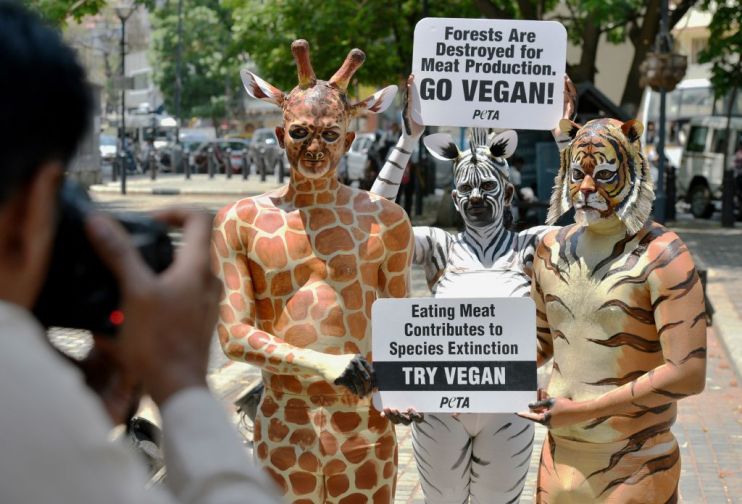This Veganuary, I’m trusting people to eat what they want

Welcome to January, the month of new year’s resolutions.
Dietary transformation has always been central to the post-Christmas madness — eating “better” is probably the most cliched resolution there is.
But whereas this used to be framed primarily in terms of weight loss, with fads like intermittent fasting and protein shakes taking centre stage, in recent years a new angle has come to dominate. Changing what we eat has become less about our personal wellbeing, and more about saving the planet — or signalling our virtue.
And so we have “Veganuary”, a concept that has turned the highly personal decision to cut down on animal products for a month into a collective frenzy to improve the world, one vegan burger at a time.
Businesses are jumping on the bandwagon. Last year, the Greggs vegan sausage roll attained cult-like status, contributing to a boost in the bakery chain’s profits of 52 per cent and proving so successful that employees have just received a £7m bonus payment.
This year, KFC’s foray into Veganuary has gone less smoothly, with several customers being mistakenly served chicken burgers. Burger King, meanwhile, came under fire when it was revealed that its own plant-based burger was unsuitable for full vegans, as it is cooked on the same grill as meat products.
These are clearly PR errors, and KFC’s negligence is probably a lawsuit waiting to happen. But delve into the depths of vegan social media, and you’ll quickly encounter backlash that goes far beyond the obvious and justifiable criticisms: namely, why would anyone who supports the vegan cause patronise Burger King or KFC at all?
The business model of these chains, the argument goes, is almost entirely based on meat. Spending money there, even on a plant-based product, is indirectly funding the meat industry, and is therefore unethical.
This reveals an interesting split in the meat-free movement. Last year, I chaired a panel on “dietary tribes” that included Alex Petrides, founder of the vegan meal startup allplants. As someone who has reduced my meat consumption but is still very much an omnivore, I was expecting judgement from a man whose job is essentially getting me to stop eating what I want.
Instead, he was positive about the fact that I was cutting down at all.
His argument was that it would be great for the planet if more people stopped eating animal products altogether, but encouraging them to cut down even a little, say with “meat-free Mondays”, was an important step. If everyone in the UK ate vegan one a day week, that would have a far bigger impact than a small handful going fully vegan.
By this logic, anyone who chooses a Burger King or KFC plant-based option is helping, and whatever else those restaurants sell, it’s positive that they’re providing reduced-meat products at all.
But the sanctimonious fury we’ve seen this week shows that not everyone sees it that way.
To the critics, veganism is less a dietary choice, more an ideological movement, where compromise is not taken lightly. It is not inaccurate to liken it to a religion — 2020 began with a tribunal ruling that ethical veganism is a philosophical belief, and thus a protected characteristic in terms of discrimination law.
The trouble with all religions is that purity has a tendency to trump pragmatism.
First, you’re less likely to win someone over to your cause if you act like anyone who doesn’t already agree with you is immoral. And second, while cutting down on animal products to protect the environment may be a worthy goal, what do you do when it has unintended consequences?
This week, the Guardian ran an article bemoaning how the almond industry is decimating bee populations. It also consumes a staggering amount of water.
In their account of this tragedy, the authors failed to mention how the shift away from dairy was spurring demand for almond milk. “How your veganism is killing bees” might have made a more accurate headline.
Or to bring things back to the topic of the day — the Royal family — consider this headline from last year: “Is Meghan’s favourite snack fuelling drought and murder?” The snack was avocados, a staple of the plant-based diet which is apparently linked to deforestation, water shortages, and ecosystem destruction.
And that’s before we get to the socio-economic ramifications if millions of people in rich countries suddenly change their diets. Increased western demand for quinoa, another vegan favourite, has had a devastating impact on the Latin American economies that produce it and has even been linked to famine.
Here in Britain, many people cannot afford fancy plant-based alternatives, or have health restrictions that the disapproving vegan watching them scoff a ham sandwich won’t be aware of. It is the height of elitism to imagine you can factor in every variable, from dietary intolerances to food poverty to the wellbeing of Bolivian farmers, and come up with the ideal ethical diet.
None of this is to discourage people from thinking about their food or attempting to live more ethically. Avoiding meat and dairy is, according to scientists, the biggest way any of us can reduce our environmental footprint. But what we choose to put in our bodies is one of the most personal decisions we can make.
So if your January resolution is committing to eating less meat, you have my full support. I’ll even join you — that Greggs vegan roll is delicious. But mine is judging people less for their dietary choices.
If anyone has a problem with that, I’ll tell them I’m saving the bees.
Main image credit: Getty